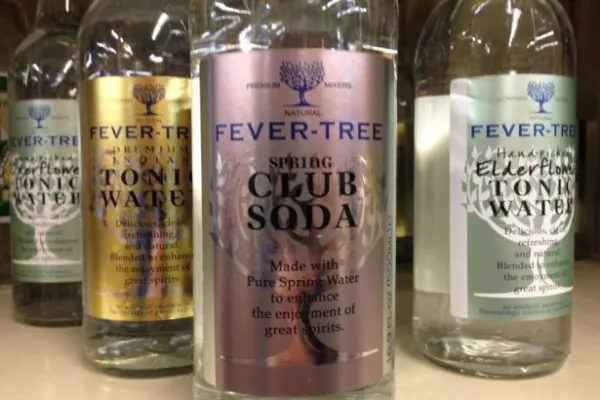Fever-Tree Drinks has said it expects to report an almost 40% jump in annual revenue on strong demand for its flavoured tonic water and premium mixers.
Fever-Tree has grown rapidly as sales of high-end gin have surged in Britain, with its shares chalking up a more than fifteen-fold increase since the company listed in 2014.
The growth in popularity of British gin, dubbed the "ginaissance", has helped it to outperform any other spirit in terms of UK sales growth, the Wine and Spirit Trade Association says. More than 66 million bottles of gin were sold in Britain last year, up 41% year-on-year, according to the association's latest figures.
"Consumers are trading up to premium quality spirits and want sophisticated mixers to match. Fever Tree was first to grasp that," said Alex Beckett of Mintel Food & Drink.
Fever-Tree said it expects revenue to have increased by 39% to £236 million in 2018, beating an estimate of nearly £224 million from investment bank Jefferies, helped by a warmer than usual summer and Christmas demand.
Fever-Tree had 12.6% of the UK's tonic market last year, according to Euromonitor International, up from just 1.6% in 2014. Market leader Coca-Cola, which owns the Schweppes brand in Britain, has seen its share fall over the same period from 34.8% to 23.4%.
Fever-Tree has also branched out into a other drinks, such as Sicilian lemonade, ginger ale and Madagascan vanilla cola to expand its portfolio.
Sales in the past year were also helped by launches of a range of low-calorie mixers and limited-edition variants of its products, such as clementine tonic and cucumber tonic.
Looking Overseas
"We continue to view Fever-Tree Drinks as one of the most attractive growth stories in European beverages," Jefferies analysts said in a note, rating the stock "buy" even though it trades at an eye-watering 38.5 times expected 2020 earnings.
Fever-Tree, named after the colloquial term for the cinchona tree that produces tonic water ingredient quinine, said UK revenue jumped nearly 52% in 2018. UK sales account for more than half of group revenue.
The UK uplift was aided by distribution agreements with Tesco and Sainsbury and a sponsorship deal with the annual Wimbledon tennis warm-up event at Queen's Club, extending the company's reach.
The question for Fever-Tree now, however, is whether it can repeat its UK success overseas, in markets where gin and tonic is less popular.
"The early signs in America are good, but the group has its work cut out if it's to emulate the stratospheric success achieved in the UK," said Hargreaves Lansdown analyst Sophie Lund-Yates. She said its success there will depend on sales of cola and ginger ale, since the tonic appetite is smaller.
"Given the shares trade on a lofty rating, there won't be much room for forgiveness if global growth goes flat."
News by Reuters, edited by Hospitality Ireland. Click subscribe to sign up for the Hospitality Ireland print edition.









